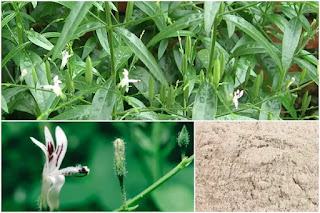Andrographis (Andrographis paniculata)

Andrographis (Andrographis paniculata), plant, powder Andrographis ( Andrographis paniculata ) is an ancient medicinal herb with an extensive history in Asia. It is commonly known as the "King of Bitters" due to its intensely bitter taste. Andrographis has been used for centuries in traditional medicine, particularly in Ayurveda and Traditional Chinese Medicine, for its potential health benefits. Here is some information about its uses, dosage, side effects, and nutritional value: Uses: Andrographis powder, derived from the Andrographis paniculata plant, is believed to offer several potential health benefits: 1. Immune support: Andrographis is often used to support the immune system and promote overall immune health. It is believed to have immunomodulatory properties, helping to strengthen the body's defenses against infections and illnesses. 2. Common cold and flu relief: Andrographis powder is frequently used to alleviate symptoms associated with the common cold and flu...

